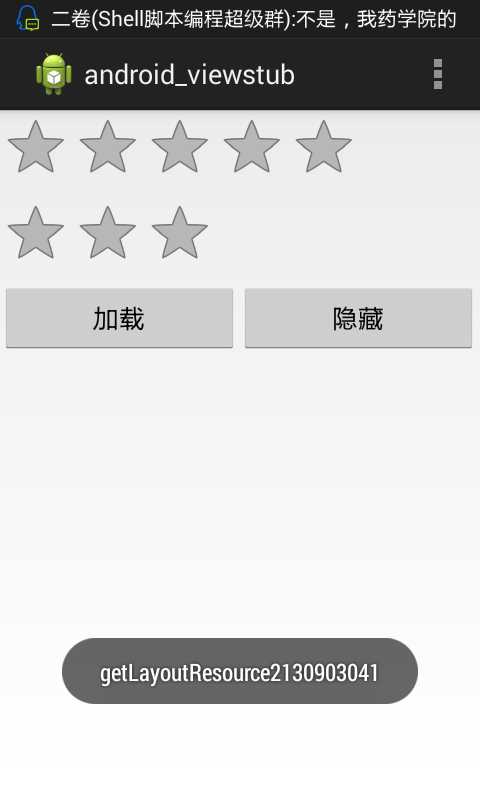标签:
一、之前我们介绍过<include>标签,该标签可以再布局文件中引用另外一个布局文件,这种方式是在布局文件中固定导入,使用起来不是很方便。
ViewtSub的功能和<include>的功能类似,也是实现引用另外一个布局。但是唯一不同的是ViewStub并不会马上装载引用布局文件,只有在调用了ViewStub.inflate或ViewStub.setVisibility(View.VISIBILE)方法ViewStub才会装载引用的控件。
二、下面我们来一个实列讲解viewstub:

在main.xml文件中:
1 <LinearLayout xmlns:android="http://schemas.android.com/apk/res/android" 2 xmlns:tools="http://schemas.android.com/tools" 3 android:layout_width="match_parent" 4 android:layout_height="match_parent" 5 android:orientation="vertical" > 6 <!-- 静态加载布局文件 --> 7 <include 8 android:id="@+id/include1" 9 android:layout_width="fill_parent" 10 android:layout_height="wrap_content" 11 layout="@layout/next" /> 12 <!-- 动态加载布局文件 --> 13 <ViewStub 14 android:id="@+id/viewstub" 15 android:layout_width="fill_parent" 16 android:layout_height="wrap_content" 17 android:layout="@layout/next" /> 18 <LinearLayout 19 android:layout_width="fill_parent" 20 android:layout_height="wrap_content" 21 android:layout_marginEnd="1dp" 22 android:orientation="horizontal" > 23 <Button 24 android:id="@+id/button1" 25 android:layout_width="0dp" 26 android:layout_height="wrap_content" 27 android:layout_weight="1" 28 android:text="加载" /> 29 <Button 30 android:id="@+id/button2" 31 android:layout_width="0dp" 32 android:layout_height="wrap_content" 33 android:layout_weight="1" 34 android:text="隐藏" /> 35 </LinearLayout> 36 </LinearLayout>
在next.xml文件中:
1 <?xml version="1.0" encoding="utf-8"?> 2 <RelativeLayout xmlns:android="http://schemas.android.com/apk/res/android" 3 android:layout_width="match_parent" 4 android:layout_height="match_parent" > 5 <RatingBar 6 android:id="@+id/ratingBar1" 7 android:layout_width="wrap_content" 8 android:layout_height="wrap_content" /> 9 </RelativeLayout>
在.java文件中:
1 private ViewStub stub; 2 private Button button1,button2; 3 @Override 4 protected void onCreate(Bundle savedInstanceState) { 5 super.onCreate(savedInstanceState); 6 setContentView(R.layout.main); 7 stub = (ViewStub) findViewById(R.id.viewstub); 8 button1 = (Button) findViewById(R.id.button1); 9 button2 = (Button) findViewById(R.id.button2); 10 button1.setOnClickListener(new OnClickListener() { 11 12 @Override 13 public void onClick(View v) { 14 // TODO 自动生成的方法存根 15 View view = stub.inflate(); //inflate()是通过ViewStub对象将next.xml加载到viewStub容器中,仅infalte这句语句就可以实现惰性装载控件 16 RelativeLayout layout = (RelativeLayout) view; //view 返回值是next.xml文件的View对象,通过强制转换得到next.xml文件中的布局对象,通过布局对象可以获得子控件Ratingbar 17 18 RatingBar bar = (RatingBar) layout.findViewById(R.id.ratingBar1); 19 bar.setNumStars(3); 20 Toast.makeText(MainActivity.this, "layout.getId();" + view.getId(), Toast.LENGTH_LONG).show(); 21 } 22 }); 23 24 button2.setOnClickListener(new OnClickListener() { 25 26 @Override 27 public void onClick(View v) { 28 // TODO 自动生成的方法存根 29 stub.setVisibility(stub.GONE);//隐藏布局 30 } 31 }); 32 33 stub.setOnInflateListener(new OnInflateListener() { 34 35 @Override 36 public void onInflate(ViewStub stub1, View inflated) { 37 // TODO 自动生成的方法存根 38 Toast.makeText(MainActivity.this, "getLayoutResource" + stub.getLayoutResource(), Toast.LENGTH_LONG).show();//getresource //的值就是next.xml(R.layout.next)的Id值
39 } 40 }); 41 }
运行结果:

注意::viewstub不能反复inflate,只能inflate一次注意:
标签:
原文地址:http://www.cnblogs.com/SoulCode/p/5401189.html